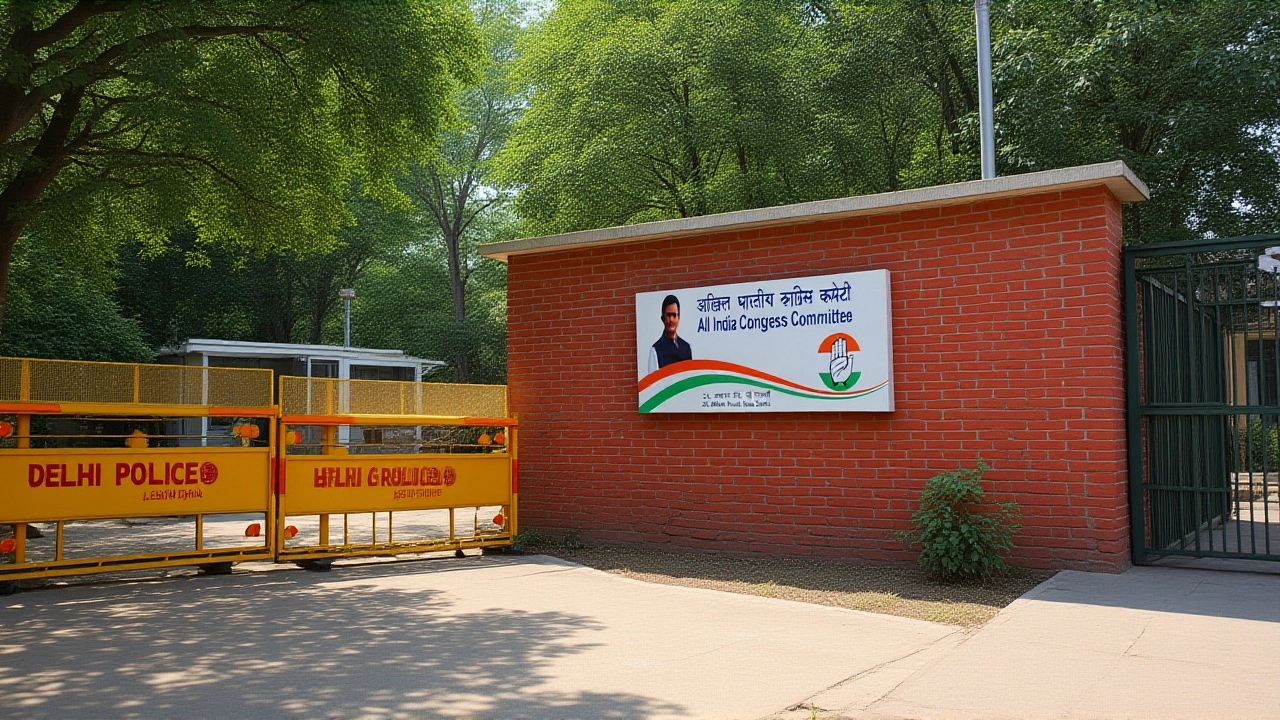The Indian government has formally demanded that the Indian National Congress vacate its iconic headquarters at 24 Akbar Road in New Delhi, citing that the party has "far exceeded" its occupancy deadline. The notice, reported on November 24, 2025, marks a seismic shift in India’s political landscape — not just because of the location’s symbolic weight, but because it forces a century-old party to abandon the very ground where its leaders have shaped the nation’s destiny since independence.
Historic Grounds, Modern Dispute
24 Akbar Road isn’t just an office building. It’s where Jawaharlal Nehru drafted India’s early policies, where Indira Gandhi held emergency meetings, and where Rahul Gandhi once walked the corridors with his mother, Sonia Gandhi. For nearly 80 years, it has been the nerve center of India’s oldest political party. Now, the government says its time is up. The exact terms of the original agreement — whether it was a lease, a temporary allotment, or a relic of post-independence accommodation — remain undisclosed. But what’s clear is this: the Congress party has overstayed its welcome, by months or possibly years, and the authorities are no longer willing to look the other way.
Located just a stone’s throw from Rashtrapati Bhavan and the Parliament House, the property sits in the most politically charged zone in the country. It’s not just symbolic — it’s strategic. The building’s central location has allowed Congress leaders to move swiftly between meetings with ministers, bureaucrats, and foreign dignitaries. Losing it means losing proximity, prestige, and perhaps, political momentum.
Who’s Behind the Notice?
While the Domain-B.com report doesn’t name the issuing authority, the most likely source is the New Delhi Municipal Council (NDMC), which manages municipal properties in the heart of the capital. Alternatively, the Ministry of Housing and Urban Affairs could be involved, given its oversight of government-allocated real estate. What’s unusual is the silence. No press release. No public statement. No explanation beyond "exceeding the deadline." That vagueness is telling. It suggests this isn’t just about property management — it’s political theater.
And the timing? It’s suspiciously convenient. On the same day the eviction notice surfaced, Devendra Yadav, the Delhi Pradesh Congress Committee chief, sent a letter to the Chief Election Commissioner alleging irregularities in voter lists for the Municipal Corporation of Delhi (MCD) by-polls. He warned that 12 Delhi wards faced a November 30, 2025 deadline for finalizing lists — and that "there is every possibility of such a major incident occurring." Is this a distraction? A preemptive strike? Or just bad luck?

Logistics and Symbolism Collide
Relocating the national headquarters of a party with 1.4 million members isn’t like moving a startup from a garage to an office park. There are archives — decades of handwritten notes, campaign files, correspondence with prime ministers — all stored in dusty rooms upstairs. There are staff — secretaries, drivers, security personnel — who’ve worked there since the 1980s. And then there’s the symbolism: the Congress flag flying over Akbar Road has been a beacon for opposition unity. Move it, and you move the heart of the party.
Where will they go? Rumors point to a rented building in South Delhi, possibly near the Saket or Dhaula Kuan areas — less central, less historic, less powerful. Some insiders whisper the party may have to split functions: one office for administration, another for media and public outreach. That fragmentation could accelerate internal divisions.
What Happens If They Don’t Leave?
The notice doesn’t spell out consequences. No fines. No legal action mentioned. But in New Delhi, when the government says "vacate," it doesn’t mean "please." It means "we’ll send the bulldozers." Past precedents — like the 2018 eviction of a political group from a property near India Gate — show that the state can act swiftly, even without court orders, if the property is classified as government-owned. The Congress party has never publicly challenged such a directive. Will they now?
So far, silence. No statement from Mallikarjun Kharge, the party president. No tweet from Devendra Yadav. No press conference. That silence speaks louder than any denial. Either they’re negotiating behind closed doors — or they’re stunned.

Why This Matters Beyond One Building
This isn’t just about bricks and mortar. It’s about power. The Congress party has spent the last decade in the wilderness, struggling to reclaim relevance. This eviction isn’t just a logistical headache — it’s a psychological blow. In a country where political identity is tied to physical space — BJP’s Rajaji Hall in Delhi, TMC’s Park Street in Kolkata — losing your address is like losing your voice.
And in the run-up to the 2029 general elections, every symbol counts. The party’s inability to hold onto its historic base may signal to voters — and donors — that it’s losing its grip. Meanwhile, the ruling party gains a quiet victory: a century-old rival is being nudged out of the center stage, not by scandal, but by bureaucracy.
On November 25, 2025, Delhi will go quiet for Guru Tegh Bahadur’s Shaheedi Diwas — a public holiday declared by Chief Minister Rekha Gupta. But while the city pauses for reflection, the Congress party may be facing its own reckoning: in the quiet, empty halls of 24 Akbar Road, the echoes of history are fading.
Frequently Asked Questions
Why is 24 Akbar Road so important to the Congress party?
24 Akbar Road has been the national headquarters of the Indian National Congress since the 1940s. It’s where major decisions were made during India’s independence movement, the Emergency, and the economic reforms of the 1990s. The building houses archival records, party leadership offices, and media centers — making it both a functional and symbolic nerve center. Losing it risks severing institutional memory and weakening the party’s public identity.
Who decides who gets to occupy government properties in New Delhi?
The New Delhi Municipal Council (NDMC) manages most municipal properties in central Delhi, while the Ministry of Housing and Urban Affairs oversees larger government allotments. Political parties often receive these properties as temporary accommodations after independence. But they’re not permanent. Over time, as usage lapses or deadlines expire, the government can reclaim them — especially if the party hasn’t paid rent or submitted renewal paperwork.
Could this eviction affect the Congress party’s performance in upcoming elections?
Absolutely. Relocating disrupts campaign logistics, weakens media access, and signals instability to donors and voters. In the 2024 elections, Congress lost ground in key urban centers. Moving out of 24 Akbar Road — especially amid allegations of voter list manipulation in Delhi — could deepen perceptions of disarray. The party’s ability to mobilize quickly during the MCD by-polls, with a November 30 deadline, may be severely hampered.
Has any other political party been evicted from a historic headquarters before?
Yes. In 2018, the All India Anna Dravida Munnetra Kazhagam (AIADMK) was asked to vacate its Chennai office after a 30-year occupancy expired. The party relocated after legal delays. More recently, in 2022, the Trinamool Congress was pressured to vacate a property in Kolkata’s Park Street, though it retained a smaller adjacent building. These precedents show that while evictions are rare, they’re not unprecedented — and they always carry political weight.
What’s the connection between the eviction and Devendra Yadav’s voter list allegations?
There’s no confirmed link, but the timing is striking. Both events broke on November 24, 2025. While the eviction is an administrative action, Yadav’s letter alleges systemic flaws in the MCD by-polls — a potential election integrity crisis. If Congress is distracted by relocation, its ability to challenge electoral irregularities weakens. Critics suspect the government may be using bureaucratic pressure to sideline opposition activity during a critical voting window.
What happens next for the Congress party?
The party has 30 days to respond under standard property protocols, though no formal deadline was stated. They may appeal internally, negotiate a phased move, or prepare for a forced eviction. Either way, they’ll need to announce a new headquarters soon — and rebuild their public image around a new address. The real test won’t be whether they leave 24 Akbar Road — but whether they can still lead from anywhere else.

